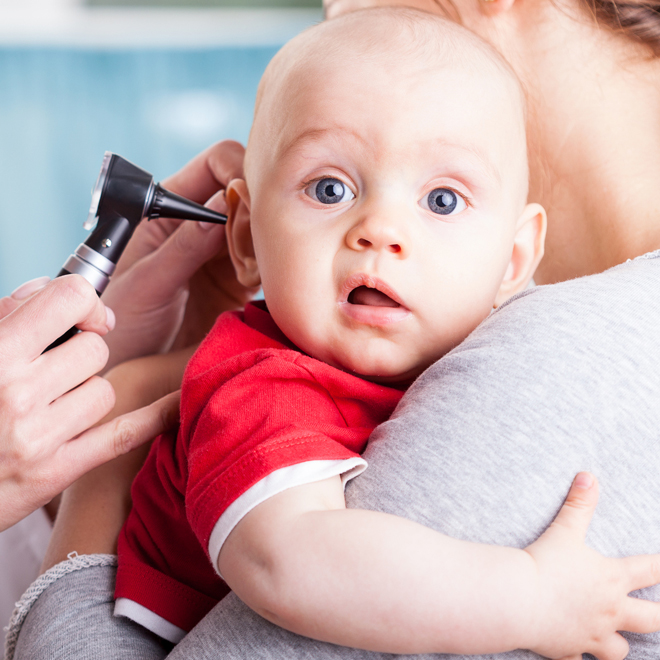When the middle ear gets infected, it is usually because of bacteria that occurs when fluid builds up behind a child’s eardrum. Though this is common among adults, it is seen more often in children than adults. Usually, children have ear infection at least once before their third birthdays.
Read More: 5 Reasons for Your Baby’s Itchy Ears
Symptoms of Ear Infection for Kids
The ear is structured into three parts: the outer ear canal, the middle ear where infections take place and the inner ear, the site for the nerves and balance centre are located. Between the middle and outer ears is a thin membrane-like eardrum. The middle ear contains the little bones that carry out vibrations in the ear drum to the brain. It is also linked to the back of the nose through the Eustachian tube.
These are the leading symptoms of ear infection among kids:
Immature Eustachian tube
Children have a short and angled tube, enabling bacteria to migrate to the middle ear through the nose and throat. As children grow, the Eustachian tube grows vertical, so germs need to travel upwards to reach the middle ear. This is why older children do not get ear infections.
Colds
When a child has a cold, his nasal passages are swollen and mucus settles at the rear of the nose. The nose then becomes most fertile ground for bacteria to proliferate. These are found in the throat and nose and begin overgrowing. The middle ear also secretes mucus.
Bacterial multiplication
Germs move up through the Eustachian tube and enter the middle ear where they multiply inside the mucus that’s stuck there. Due to the pus formation here, the middle ear is soon filled with pus, mucus and bacteria.
Ear pain
Pus causes the eardrum to swell up and turn red.
Reduced hearing
Pus collects in the middle ear and presses down on the eardrum, thereby preventing it from normal vibrations and dampening the execution of these vibrations on the small bones. As the fluid blocks the Eustachian tube, it wets the sound your child hears.
Treatment
There are two types of treatments doctors offer kids with ear infection. These include:
Painkillers for pain relief
Your child can only feel comfortable with good pain relief measures. You can give him Paracetmol or Ibuprofen for pain relief and to get rid of any fever, steps that will make him feel comfortable. Follow the dosage instructions on the leaflet or bottle, as giving more than the recommended dose could be very dangerous for your child. Speak to your doctor for the correct pain relief dosage.
Read More: Tips For Taking Care Of Your Kid’s Ears
Antibiotics
Perhaps, your doctor could wait a while for the infection to clear up. Else, he may recommend treating the infection with antibiotics, particularly he is running a fever. Whether to give your child antibiotics or not could depend on:
- The severity of the infection
- His age
- The frequency of his middle ear infections
- The duration of his infection
- Whether he has had complications from ear infections earlier
- Whether he has any other medical problems
Managing your child’s ear infection
Though ear infections can be painful, yet there are effective measures to ease your child’s pain. Some of them are:
Acetaminophen
Babies older than six months of age can be given acetaminophen (Tylenol) for pain relief and fever. Give your child the medication prescribed by your paediatrician. For best results, give him a dose at bedtime.
Warm compress
Place a warm and moist compress on the child’s ear for a few minutes to reduce pain.
Warm oil
If there’s no liquid oozing out of your child’s ear, you can safely put in a few drops of warm oil in his ear for pain relief.
Keep him on liquids
Give him fluids to drink as often as possible. By swallowing drinks, his Eustachian tube will open up and the fluid trapped therein can drain easily.
Raise his head in bed
Raise his crib at the head so that his sinus drains well. Place a pillow or two below his mattress, not under his head.
Homeopathic ear drops
Try giving your child homeopathic ear drops with extracts of lavender, garlic, St. John’s wort and mullein in olive oil to cure the pain and inflammation.
Read More: 6 Safety Tips Before Piercing your Baby’s Ears
Conclusion
If your child gets ear infections often, you might like to have him seen by an ENT specialist for safe and effective treatments.














